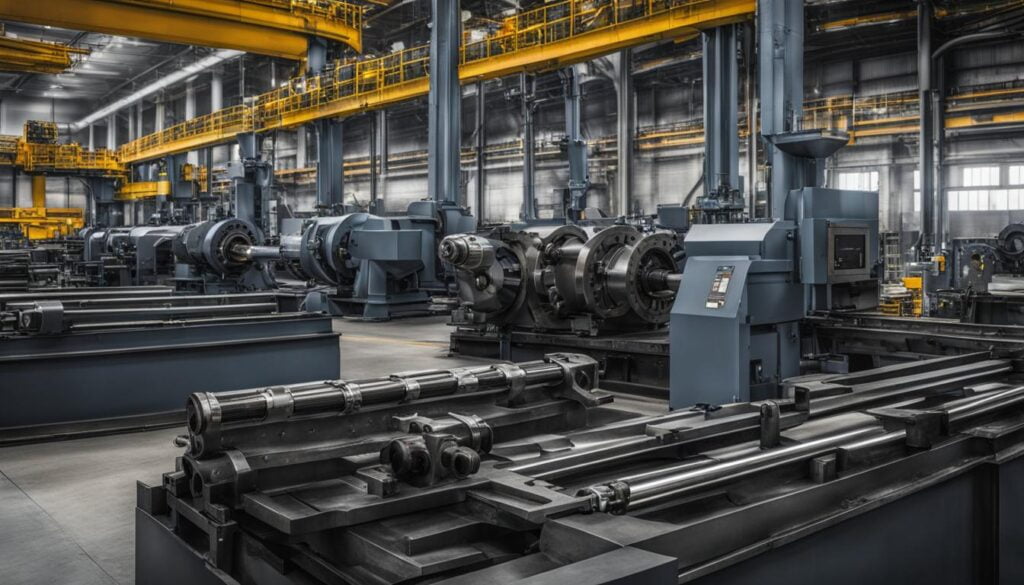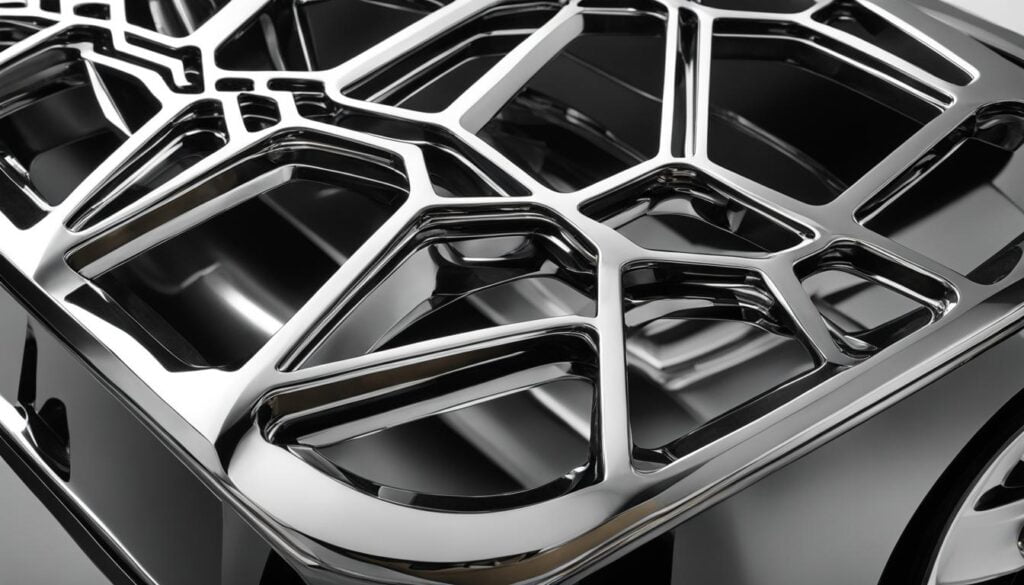Alloy Steel Castings are playing a vital role in the automotive industry, constituting approximately 54% of the average vehicle weight. The industry’s commitment to safety, durability, and recyclability of steel has led to the development of over 200 new steel grades that offer six times the strength of those from a decade ago. These innovations in Advanced High-Strength Steels (AHSS) facilitate the production of lighter vehicles with reduced carbon footprints, cutting down life cycle CO2 emissions by up to 15%. Additionally, the rise of electric vehicles has driven the use of AHSS to further reduce vehicle weight and extend battery range, underpinning our commitment at KT-Foundry to advancing these transformative materials.
Key Takeaways
- Alloy Steel Castings make up roughly 54% of a vehicle’s weight, contributing to Automotive Industry Innovation.
- Advanced High-Strength Steels offer six times the strength of steel grades from a decade ago, enhancing Vehicle Safety and Fuel Economy.
- Alloy Steel contributes to Carbon Footprint Reduction by enabling lighter vehicles with decreased life cycle CO2 emissions.
- Electric Vehicles benefit from the use of AHSS to reduce weight and extend battery range.
- Material Science advancements, Recycling, and KT-Foundry’s research are crucial in furthering the potential of Alloy Steel in the automotive industry.
The Role of Advanced High-Strength Steels in Modern Vehicles
Advanced High-Strength Steel (AHSS) is shaping the automotive sector, paving the way for a new era of vehicle design and performance.
Characteristics and Benefits of Advanced High-Strength Steel (AHSS)
AHSS is known for its remarkable blend of lightweight design and strength, offering several key benefits to various automotive applications. Its ability to withstand high stresses enables superior durability compared to traditional steel, while its lightweight properties allow for fuel efficiency improvements in vehicle manufacturing. Consequently, AHSS can achieve a 25% structural weight reduction over conventional steel materials, boosting vehicle performance and handling.
Impact of AHSS on Vehicle Fuel Economy and Emissions
The adoption of AHSS in the automotive sector has yielded significant benefits in fuel economy, as the reduced structural weight directly translates to lower fuel consumption. As vehicles become lighter, less energy is needed to propel them, thereby conserving fuel and easing the burden on the environment.
Integrating AHSS components into vehicle design has been key to meeting stringent emission standards while ultimately reducing overall carbon emissions and promoting environmental sustainability.
Adoption of AHSS in Electric Vehicle Design and Efficiency
The ongoing push towards electric vehicles (EVs) has further amplified the importance of AHSS in vehicle design. The lightweight characteristics of AHSS significantly enhance battery efficiency, enabling longer range per charge. This trend has spurred the adoption of AHSS throughout the electric vehicle sector, which is expected to grow rapidly in the coming years.
- Increased battery efficiency: The reduced weight of vehicles using AHSS positively impacts battery performance, allowing EVs to travel longer distances on a single charge.
- Range extension: By decreasing vehicle weight, AHSS directly contributes to extending the operational range of EVs, addressing one of the key hurdles faced with electric transportation.
- Environmental sustainability: Electric vehicles powered by clean energy sources have a significantly lower carbon footprint, while AHSS ensures minimized emissions from vehicle production and throughout the vehicle lifecycle.
In conclusion, Advanced High-Strength Steel is pioneering modern vehicle design in the automotive sector. From enhancing fuel efficiency and emission reduction to promoting electric vehicle development and environmental sustainability, AHSS’s impact on the industry is undeniable. As leading material innovation continues to evolve, industry stakeholders and consumers alike stand to benefit from the transformative properties of AHSS.
KT-Foundry’s Innovation in Alloy Steel Manufacturing

As the automotive industry continually evolves, the demand for innovative, high-performance materials increases. KT-Foundry is dedicated to developing new steel grades, designed explicitly for automotive applications. Our focus on steel grade innovation has led to the creation of stronger and lighter alloys, contributing to the advancement of mobility solutions.
Developing New Steel Grades for the Automotive Industry
KT-Foundry Alloy Steel production relies on state-of-the-art manufacturing technologies to experiment with and create new steel grades. These advanced grades maximize vehicle safety and performance while minimizing environmental impact. Each new grade helps automotive manufacturers achieve better fuel efficiency and reduced emissions, making our steel indispensable for the future of transportation.
New steel grades are essential to drive the evolution of advanced mobility solutions.
Custom Alloy Solutions for Enhanced Vehicle Safety and Durability
As a pioneer in automotive applications, KT-Foundry specializes in developing custom alloys that exceed safety and durability standards. By partnering with manufacturers, we have created customized materials designed to withstand heavy usage while maintaining optimal safety performance.
Our custom alloys and vehicle safety enhancement solutions are tailored specifically to the diverse needs of our clients. With a focus on durable steel solutions, we are continually improving and expanding our offerings to ensure the utmost quality and protection for every vehicle. Our attention to detail and dedication to innovation make KT-Foundry Specialty a trusted name in the automotive sector.
| New Steel Grades | Custom Alloys | Manufacturing Technologies |
|---|---|---|
| Increased strength and lightness | Enhanced vehicle safety | State-of-the-art processes |
| Focused on automotive applications | Optimized durability | Customized solutions for clients |
| Environmental benefits | Tailored for heavy usage | Continual advancements in the industry |
As we progress into a future of efficient, connected, and environmentally sustainable vehicles, KT-Foundry’s innovations in alloy steel manufacturing will continue to make a significant impact on the automotive industry. With our expertise and dedication to quality, we look forward to playing an essential role in shaping the future of transportation.
Emerging Trends in Automotive Steel Applications
As the automotive industry evolves, its reliance on advanced materials and manufacturing techniques increases. This continuous innovation manifests in multiple ways, with some trends gaining prominence in the realm of automotive steel. In this section, we will examine some of the most influential trends in automotive steel applications, such as the integration of simpler alloys for sustainability and the increasing use of novel techniques like hot stamping and quenching to create ultra-high-strength steels.

The ever-growing emphasis on sustainability in the automotive sector is inspiring manufacturers to integrate simpler alloys into their designs. With a focus on maintaining high performance while minimizing environmental impact, synergy between these two objectives has sparked innovative solutions. One such example includes the use of advanced high-strength steels (AHSS) created with lesser alloying elements, providing a sustainable alternative to traditional alloy steels without compromising on strength, durability, and versatility.
Hot Stamping and Quenching Techniques
The industry is witnessing a growing interest in enhancing material properties by adopting innovative manufacturing techniques. Hot stamping and quenching have emerged as popular methods of creating ultra-high-strength steels that cater to the requirements of modern vehicles. Hot stamping provides complex geometric shapes, enabling the optimization of structural designs, whereas the accompanying quenching process further strengthens the material, delivering superior crash performance and increased passenger safety.
Automotive steel innovations are leading the industry towards a new era, incorporating advanced alloys and techniques that enable manufacturers to produce increasingly efficient, safe, and sustainable vehicles.
- Lightweight steel construction for improved fuel efficiency and reduced emissions
- 3rd generation AHSS grades for enhanced strength and formability
- Integrated hot-stamping, roll-forming, and tailored tempering processes for superior safety and structural integrity
- Digital tools and Industry 4.0 methodologies for guided steel application and efficient manufacturing
In conclusion, the future of automotive materials will showcase a diverse array of Automotive Steel Trends and Innovative Steel Applications. These emerging trends mark the ongoing transformation of the industry and ensure that steel will continue to play a crucial role in shaping the vehicles of tomorrow. The embrace of sustainability and novel manufacturing techniques suggests that the scope of steel use will only broaden, leading to even more cutting-edge developments in alloy composition and material properties.
Environmental Sustainability and Lifecycle Advantages of Alloy Steel
One of the most profound influences of sustainable alloy steel on the automotive sector is its potential to minimize the environmental impact and enhance the lifecycle advantages associated with vehicle manufacturing. By adopting alloy steel, the industry can make substantial strides in reducing life-long vehicle carbon emissions, contributing significantly to global sustainability efforts.
At the core of alloy steel’s lifecycle advantages is its recyclability, which ensures the efficient use of materials and conservation of resources. The automotive and steel industries are working jointly to improve the sustainability profile of steel throughout its life cycle. This collaboration encompasses aspects such as material innovation, process optimization, and automotive recycling.
Innovation in alloy steel manufacturing has the potential to transform the environmental footprint of the automotive industry, providing a more sustainable solution for our planet.
- Energy and Emission Reduction
- Resource Conservation
- Waste Minimization
- Recyclability and Reusability
- Improved Lifecycle Performance
By focusing on these aspects, we can capitalize on the innate properties of alloy steel to create greener vehicles that benefit both the industry and our environment.
To provide a tangible understanding of the potential environmental benefits that alloy steel offers, consider the following table, which demonstrates the impact of alloy steel in various lifecycle stages:
| Stage | Environmental Impact | Example Benefits |
|---|---|---|
| Production | Energy Consumption & Emission Reduction | Efficient manufacturing processes lower energy consumption and reduce greenhouse gas emissions |
| Use | Improved Fuel Efficiency | Lightweight alloy steel allows for better fuel economy and fewer emissions throughout vehicle usage |
| End-of-Life | Recyclability | Effortless recycling and recovery of high-quality steel at end-of-life contributes to a circular economy |
In conclusion, the sustainability of alloy steel, coupled with its lifecycle advantages, contributes to the environmental stewardship within vehicle manufacturing. By embracing alloy steel, the automotive sector can work hand-in-hand with the steel industry to create a sustainable and eco-friendly future.
Conclusion
Alloy steel has made a significant impact on the automotive sector, leading to remarkable transformations in vehicle safety, fuel economy, and environmental footprint reduction. These advancements have been largely driven by the continuous investments in advanced materials and innovative technologies that have revolutionized the way vehicles are designed and manufactured.
At the heart of these cutting-edge developments is KT-Foundry’s dedication to alloy steel advancement. Our unwavering commitment to material innovation and customized alloy solutions have greatly contributed to the ongoing progress in the automotive sector and reinforced our position as a pioneering leader in the development of high-quality, high-strength steels.
As we look to the future, our vision remains focused on pushing the boundaries of alloy steel technology and exploring new avenues for automotive innovation. By staying at the forefront of emerging trends and harnessing the full potential of advanced materials, we are confident in our ability to drive the next wave of industry-transforming breakthroughs and propel the automotive sector towards a greener, safer, and more sustainable future.
FAQ
What are the primary benefits of using Advanced High-Strength Steels (AHSS) in the automotive industry?
The primary benefits of AHSS include increased vehicle safety, improved fuel economy, reduced carbon footprint, and enhanced recyclability. These steels also contribute to the development of lighter and more durable vehicles that meet stringent emission standards.
How does the use of AHSS impact vehicle fuel economy and emissions?
By incorporating AHSS, vehicles can reduce their structural weight by about 25%, leading to significant fuel economy benefits. Lower tailpipe emissions are also achieved, reducing a vehicle’s ecological impact throughout its lifespan.
Why is AHSS becoming important for electric vehicle design and efficiency?
The reduced weight provided by AHSS contributes to increased battery efficiency and longer range per charge, making it an essential material in the evolving electric vehicle sector. As the industry pushes for electrified and connected vehicles, AHSS adoption is critical in realizing future mobility.
What are some innovations KT-Foundry is focusing on in alloy steel manufacturing?
KT-Foundry is committed to developing new steel grades for automotive use, emphasizing the creation of strong and lightweight alloys. Additionally, the company specializes in custom alloy solutions that exceed safety and durability standards in vehicles.
What emerging trends can we expect in automotive steel applications?
The automotive sector is observing trends like incorporating simpler alloys for sustainability and employing novel techniques such as hot stamping and quenching for creating ultra-high-strength steels. These advancements aim to improve material properties and usher in a new era of automotive manufacturing.
How does alloy steel contribute to environmental sustainability and lifecycle advantages in the automotive industry?
Alloy steel offers environmental benefits due to its recyclability and potential for reducing lifelong vehicle carbon emissions. Both the automotive and steel industries are working together to improve the sustainability profile of steel throughout its life cycle.


